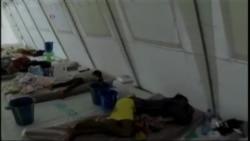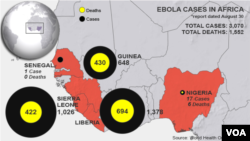The United Nations World Health Organization is calling for a coordinated global response to combat the growing Ebola outbreak affecting parts of West Africa.
Margaret Chan, director-general of the global health body, Wednesday said the outbreak has so far killed more than 1,900 people and infected at least 3,500 in the region.
"It has become a global threat and we require urgent action and we need a well-coordinated mechanism bringing together the countries affected, as well as development partners from other countries, including USA," she said. "Now that I am in U.S., I want to tell you, the U.S. government has been a very strong supporter through many agencies like the CDC, NIH, and of course USAID and others."
The WHO estimates that it will cost upwards of $600 million to tackle the epidemic.
The health organization has introduced a plan it calls a "roadmap" for stopping the spread of Ebola.
Chan said the proposed roadmap has wide support from countries and institutions throughout Africa, and that many developed countries have responded as well.
"Ebola is an international issue, a global threat that requires global coordination to get it done,” said Chan.
Chan also said scientists at WHO headquarters in Geneva will evaluate the most promising experimental therapies that could be fast-tracked to help contain the outbreak.
David Navarro, the United Nations coordinator for Ebola, also spoke fo the need for coordination.
"Those of us who have worked in complex situations know that coordination saves lives and improves efficiency… We're not in a position where we can afford to lose a day because this outbreak is currently moving ahead of efforts to control it," said Navarro.
Tom Kenyon, director of the Center for Global Health at the U.S. Centers for Disease Control and Prevention, says the virus is "spiraling out of control" and that the window of opportunity to fight it is closing.
U.S. health officials say the key to containing the outbreak will be increasing the number of Ebola treatment centers, providing protective equipment for health workers and monitoring the contacts of those infected.
Experts have warned that Ebola could spread beyond the five West African countries that have been affected: Guinea, Liberia, Nigeria, Senegal and Sierra Leone.
The World Health Organization says a separate, smaller outbreak in a remote part of the Democratic Republic of Congo is unrelated to the Ebola outbreak in West Africa.
"Democratic Republic of Congo, this outbreak is smaller, and at this point in time we have epidemiological evidence as well as viruses sequencing to demonstrate that this is an independent outbreak," Chan said. "It is important to highlight this point. It is not a spread from West Africa to central Africa, so that means we are seeing a much, much bigger outbreak, or people coined the term epidemic, in West Africa while at the same time DRC is reporting a smaller outbreak on its own."
Meanwhile, a British nurse infected with Ebola has been released from the hospital after recovering from the virus.
The Royal Free London Hospital said Wednesday that William Pooley's 10 days of treatment included the experimental drug ZMapp.
He was taken to the hospital last month after contracting Ebola while working in Sierra Leone.
Carol Pearson contributed to this report from Washington.







